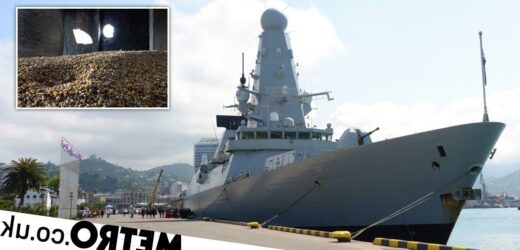Warships could be used to help retrieve millions of tons of grain from blockaded Ukrainian ports.
Lithuania’s foreign minister Gabrielius Landsbergis said time was running out to prevent mass food shortages in vulnerable nations.
Ukraine claims more than 22million tons of grain are currently sitting in silos in the country, but a Russian blockade of ports is preventing their export.
Thirty-six countries rely on Russia and Ukraine for staples including more than half their wheat imports, the UN says.
Poorer nations such as Lebanon, Syria, Yemen, Somalia and Democratic Republic of Congo are all affected, but fears remain that western attempts to fetch the grain could lead to fighting with Russia.
However, Mr Landsbergis said the time was coming ‘where we need to find solutions’.
He and British foreign secretary Liz Truss have discussed the potential creation of a ‘protective corridor’ from Odesa.
Under the plan, long-range missiles would be deployed to discourage any Russian attempts to ‘sabotage’ the corridor, reports the Times.
Allied navies, such as troops from Britain, could work to clear the port area of potential Russian mines, before launching freight ships to carry the grain away from Ukraine.
Mr Landsbergis told Sky News: ‘There is a chance to form a coalition of countries, maybe some Nato countries, maybe from some that need the grain, that could provide ships or planes that would be stationed in the Black Sea and provide a safe maritime passage for the grain ships to leave [Ukraine’s] Odesa port and reach the Bosporus and Turkey.’
He insisted: ‘It would not signify an escalation because it’s not taking part in the war.
‘It’s just securing the grain passage from Ukraine to the countries that need it.’
As the war in Ukraine continues, fears over a global food crisis have risen.
Huge quantities of food and other commodities remain in storage, leading to a massive backlog.
US secretary of state Anthony Blinken has described shortages and price pressure as ‘the greatest global food security crisis of our time’.
And Governor of the Bank of England, Andrew Bailey, told MPs there is ‘very real income shock’ coming from energy prices and ‘apocalyptic’ food prices.
Ukraine and Russia export a third of the world’s total wheat and barley and 50& of its sunflower oil.
The cost of wheat has soured in recent months, fuelling the inflation in food prices that was already rising because of post-Covid supply chain problems.
In addition, Russia is a top supplier of fertiliser.
Western officials also fear the Kremlin has embarked on a ‘deliberate policy’ of dismantling infrastructure needed to produce food and preventing it from being exported.
Russian forces have reportedly destroyed silos and other equipment in major cities including Kherson, Luhansk and Donetsk.
This week, Kremlin spokesman Dmitry Peskov said: ‘We are not the source of the problem. The source of the problem that leads to world hunger are those who imposed sanctions against us, and the sanctions themselves.’
The UN has estimated that 1.7 billion people in more than 100 countries around the world are feeling the impact of the current surge in the price of food, energy and goods.
Get in touch with our news team by emailing us at [email protected].
For more stories like this, check our news page.
Source: Read Full Article




